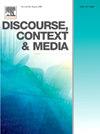@Fesshole and the discourse of confession on X: A study of online sharing and community building
IF 3.1
2区 文学
Q1 COMMUNICATION
引用次数: 0
Abstract
As a centuries-old discursive practice, confessional acts that are typically understood as an acceptance of one’s guilt or shame regarding a particular action or thought, have been observed and studied in various contexts including religion, law and crime, and medicine. However, the nature and practice of confessions have been increasingly reconfigured within newer, evolving digital media contexts. Social media platforms, such as X (formerly Twitter), have afforded users diverse ways to interact and engage in self-presentation online. The growing need to build and be part of communities, as well as reconceptualised notions of trust, intimacy and authenticity online, facilitated by mechanics of social media platforms and user anonymity have altered conventional notions of confession and absolution. This paper explores the reconfiguration of confessional acts by analysing a corpus of posts submitted to the X account @fesshole, which solicits confessions from its community of followers in a non-institutional, public online context. We analyse the posts by borrowing from van Dijk’s (2015) socio-cognitive model for analysis of discourse, which focuses on the micro and macro levels on which cognition mediates in terms of socially shared norms and ideologies within and across discursive communities. The results of the analysis suggest that X users establish rapport through confessions of an intra- and interpersonal nature about topics of varying degrees of seriousness and in ways that give the ambient online audience something to relate to and connect with. In doing so, confessors seek to bond in place of absolution, and they offer inspiration or commonality in place of guilt.
@Fesshole与X上的告白话语:网络分享与社区建设研究
作为一种有几个世纪历史的话语实践,忏悔行为通常被理解为接受一个人对特定行为或思想的内疚或羞耻,已经在各种背景下被观察和研究,包括宗教、法律、犯罪和医学。然而,在更新的、不断发展的数字媒体环境中,忏悔的性质和实践已经越来越多地重新配置。社交媒体平台,如X(以前的Twitter),为用户提供了多种互动和在线自我展示的方式。在社交媒体平台和用户匿名机制的推动下,建立和成为社区一部分的需求日益增长,信任、亲密和在线真实性的概念重新概念化,改变了传统的忏悔和赦免观念。本文通过分析提交给X账户@fesshole的帖子语库,探讨了忏悔行为的重新配置,该账户在非机构的公共在线环境中向其追随者社区征求忏悔。我们借用van Dijk(2015)的话语分析社会认知模型来分析这些帖子,该模型侧重于微观和宏观层面,在微观和宏观层面上,认知以话语社区内部和跨话语社区的社会共享规范和意识形态为中介。分析结果表明,X用户通过对不同严肃程度的话题的内部和人际性质的忏悔,并以给周围的在线观众一些与之相关和联系的方式建立融洽关系。在这样做的过程中,忏悔者寻求的是联系而不是赦免,他们提供的是灵感或共性而不是内疚。
本文章由计算机程序翻译,如有差异,请以英文原文为准。
求助全文
约1分钟内获得全文
求助全文

 求助内容:
求助内容: 应助结果提醒方式:
应助结果提醒方式:


